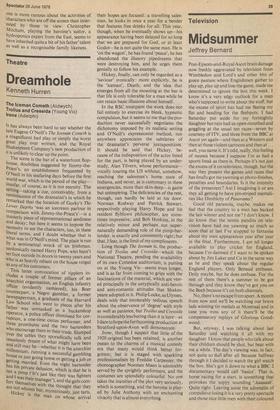Theatre
Dreamhole
Kenneth Hurren
The Iceman Cometh (Aldwych) Troilus and Cressida (Young Vic) Irene (Adelphi)
It has always been hard to say whether the late Eugene O'Neill's The Iceman Cometh is
a magnificent bad play or simply the worst great play ever written, and the Royal Shakespeare Company's new production of it is unlikely to clear up the point.
The scene is the bar of a waterfront flophouse, doubtless suggested by jimmy-thePriest's, an establishment frequented by O'Neill in his seafaring days before the first world war, which is the period of the play—
insofar, of course, as it is not eternity. The setting—taking a cue, conceivably, from a reminiscence of the dramatist's in which he
remarked that the location of Gorky's The Lower Depths was an icecream parlour in comparison with Jimmy-the-Priest's'—is a masterly piece of representational seediness and decay; but here it seems to impose the necessity to see the characters, too, in these literal terms, and I doubt whether that is What was in O'Neill's mind. The place is run by a sentimental wreck of an Irishman, sardonically named Harry Pope, who hasn't set foot outside its doors in twenty years and who is as heavily reliant on the house rotgut as any of his customers.
This latter convocation of tipplers includes a couple of former pillars of an anarchist organisation, an English infantry officer (evidently cashiered), his Boer counterpart, a Negro gambler, a former newspaperman, a graduate of the Harvard Law School who went to pieces after his father was unmasked as a bucketshop operator, a police officer dismissed for corruption, a one-time circus performer, and three prostitutes and the two bartenders who encourage them in their trade. Slumped Over the tables they sporadically talk and ceaselessly dream of what might have been and still may be—whether it is the anarchist millennium, running a successful gambling house or just going home or getting a job or getting married. Even the night bartender has his private delusion, which is that he is not a pimp (Ws just like they was fighters and I was their manager'), and the girls comfort themselves with the thought that they are not whores but, mysteriously, just tarts. Hickey is the man on whose arrival their hopes are focused : a travelling salesman, he looks in once a year for a bender that features free drinks for all. This year, though, when he eventually shows up—his appearance having been delayed for so long that we are prepared for God, or at least Godot—he is not quite the same man. He is on the wagon', he has found 'peace', he has abandoned the illusory pipedreams that were destroying him, and he urges them genially to follow his example.
Hickey, finally, can only be regarded as a 'saviour' ironically : more explicitly, he is the 'iceman', Death, and the idea that emerges from all the moaning at the bar is that life is only tolerable for a man while he can retain basic illusions about himself.
In the RSC treatment the work does not fail entirely to exercise its bleak, hypnotic compulsion, but it seems to me that the production never successfully negotiates the dichotomy imposed by its realistic setting and O'Neill's expressionist method, nor anywhere appreciates the subtleties of the dramatist's perverse juxtapositions. It should be said that Hickey, because of the indisposition of the actor listed for the part, is being played by an understudy, Alan Tilvern, whose performance— vocally touring the US without, somehow, reaching the salesman's home state of Indiana, and never, as is customary in these emergencies, more than skin-deep—is game but uninspiring. The deficiencies of the rest, though, can hardly be laid at his door. Norman Rodway and Patrick Stewart, respectively playing Harry Hope and his resident flyblown philosopher, are sometimes impressive; and Bob Hoskins, in the relatively minor and perhaps not supernaturally demanding role of the pimp-bartender, is exactly and consistently right ; but that, [fear, is the limit of my compliments.
Long though The Iceman is, the production of Troilus and Cressida—which the National Theatre, pending the availability of its own Cottesloe auditorium, is putting on at the Young Vic—seems even longer, and is as far from coming to grips with the fascinations of the material, which are vested principally in the untypically anti-heroic and anti-romantic attitudes that Shakespeare adopted in it. Philip Locke, as Ulysses, deals with that intolerably tedious speech about the observance of 'degree' with style as well as patience, but Troilus and Cressida isconsiderably less boring than it is here—as I dare to hope the forthcoming production at Stratford-upon-Avon will demonstrate.
Irene, though I suspect that little of the 1920 original has been retained, is another paean to the charms of a musical comedy era that many would think better forgotten; but it is staged with sparkling professionalism by Freddie Carpenter, the choreographer Norman Maen is admirably served by the sprightly performers, and the costumes are splendidly colourful. No one takes the inanities of the plot yery seriously, which is something, and the heroine is played by Julie Anthony with an enchanting vivacity that is almost everything.














































 Previous page
Previous page